Relationship of SCJ and SDGs
Relationship of SCJ and SDGs
Focusing on recommendations in the 23rd term and the 24th term
The high-level objective of the recommendations of the Science Council of Japan (SCJ) is the achievement of human well-being. The roles of various recommendations that originated mainly in the 23rd term and the 24th term, October 1, 2014 - September 30, 2017, are directly and indirectly connected to the UN`s Sustainable Development Goals (SDGs). One goal is assigned for one recommendation to introduce diverse proposals equally to each SDG. Most recommendations are related to multiple goals. From this point of view, their summary will be shown as follows.
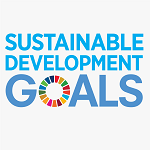
| Thinking with society: The Next Step for Advancing Science and SDGs ( Japanese version only) |
|
This document reports on and reviews the activities and measures taken by the Science Council of Japan to promote the United Nations’ Sustainable Development Goals (SDGs). Emphasis is placed upon the importance of dialogue, co-thinking and co-creation between scientists and citizens. While other major national academies do not necessarily show a keen interest in the SDGs, we, the members of the Science Council of Japan, regard the SDGs as an ideal platform for collaboration with citizens, various NPOs, business and government sectors. As the Science Council of Japan embraces not only natural sciences but also the humanities and social sciences, the academy is all the more suited to tackling the complex challenges of the SDGs that require not only analytic but also synthetic thinking. |
Goal 1. End poverty in all its forms everywhere
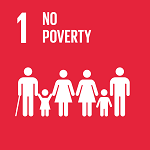
| Towardsthe Improvement of Child Growth Environments -Challenges and Suggestions of the Child Growth Space 2020- (Japanese version only) |
|
Japan is experiencing the world's first historical transition to a society with a declining population, a declining birthrate and an aging population. This is a shift that humanity has never faced before, and one that could shake the very foundations of Japan's social and economic structure and its sustainability. This proposal provides an overview of the state of population change, its challenges, its perceptions, and the way forward as a basis for understanding this situation, and then provides a direction and concrete measures for the ”happy society”. |
| The Future of a Depopulating Society: Building a Sustainable and Happy Society (Japanese version only) |
|
Japan is experiencing the world's first historical transition to a society with a declining population, a declining birthrate and an aging population. This is a shift that humanity has never faced before, and one that could shake the very foundations of Japan's social and economic structure and its sustainability. This proposal provides an overview of the state of population change, its challenges, its perceptions, and the way forward as a basis for understanding this situation, and then provides a direction and concrete measures for the ”happy society”. |
Elimination of poverty in Japan
| Toward expansion of youth support policy(Japanese version only) |
Committee on Sociology/Social Welfare
Subcommittee on Social Change and Youth Problem |
The problem of "youth poverty" is serious in Japan, amidst the prolonged economic slump and social change since 1990s. We suggested actions from the 5 perspectives, safety net, education/human resource development, employment, gender, region, so that young people's present and future life will be stable and vital. |
Elimination of poverty in the world
| Japanese style strategic support for industrial development(Japanese version only) |
Committee on Area Studies
Subcommittee on International Regional Development Research |
In order to eliminate poverty in developing countries, it is extremely important to realize industrial development, to create employment and to improve the standard of living. However, there is no widely accepted strategy for industrial development. In order to provide more effective development support, Japan which has abundant proven track record of assisting developing countries in Asia, should develop support strategies by taking advantage of its experience. |
Goal 2. End hunger, achieve food security and improved nutrition, and promote sustainable agriculture

| Agro-information Systems Science towards Population Decreased Society (Japanese version only) |
|
The statement proposes the management tactics on agricultural data and information toward the sustainability of agriculture, while the up-coming productivity crisis will be due to rapidly decreases in labor population with higher aging and less young newcomers. The action expected is to build up the database describing all process of farm works, useful for designing the automated, high-efficient, and systematized mechanisms, incorporated with an equity evaluation scheme to the stakeholders. The following actions are expected: to develop a science to manage the smart food chain system, to promote an open innovation initiative in the field of agricultural information science and technology, and to encourage the capacity building activities. |
| Proposal for control measures against African Swine Fever(Japanese version only) |
|
African swine fever (ASF) is a fatal infectious disease in pigs that threatens food security. In 2018, ASF entered into the world’s biggest pork consumer, China, and keeps spreading neighboring countries resulting in devastating loss. To prevent the entry and spread of ASF in Japan, the following proposal was made: 1) Enhancement of the administrative measures including promotion of public understanding, animal quarantine system, control measures at national and local government levels, and inter-ministry cooperation. 2) Enhancement of the biosecurity at a farm level. 3) Promotion of survey and research related to ASF not only from veterinary and epidemiological aspects, but also from socioeconomical aspects. Science Council of Japan will provide related academic information for public understanding by cooperating with related professional associations. |
Stabilization of world food production
| Necessity of improving foundation of soil science and strengthening research under both slow and sudden environmental changes(Japanese version only) |
Committee on Agriculture
Subcommittee on Soil Science |
The foundation of food production is agriculture, but the obstacle to agricultural production is now the soil change that is accelerating due to environmental changes such as intensification of weather phenomena in the world, including Japan. Soil contamination due to harmful substances is also serious in some areas. We recommended how to do science and education in Japan, for the international problem of sustainably raising its production function while maintaining the original function of the soil, which supports the ecosystem. |
Another approach for stabilization of world food production
Challenges and developments of breeding science dealing with climate change (Japanese version only)
|
Committee on Agriculture
Subcommittee on Plant Breeding |
The development of crops is important to improve the productivity of agriculture. For example, deterioration of the grain quality of rice in Japan and of the quality of fruits in the world was caused by climate change such as global warming. We discussed issues to develop crops to improve yield tolerating such fluctuations. We also examined issues to realize sustainable agricultural production that reduces the burden on the environment. |
Goal 3. Ensure healthy lives and promote well-being for all at all ages

| Management and Promotion of Organ Transplantation and Regenerative Medicine in Japan(Japanese version only) |
|
Although organ / tissue transplantation is the established medical technology, the number of organ / tissue donations and transplants remains very small. The number of donated organs under cerebral death has gradually increased since the enforcement of the revised Organ Transplant Law, however it is still much less than that recorded in other countries. There are also no legislation on transplantation of tissues. To overcome this issue, this proposal advocates human resource development and enhancement of relevant programs.
Despite the advancements of regulatory reform, there are still few approved regenerative medicine products. In order to establish regenerative medicine and cell therapy as the healthcare industry, this proposal clarifies specific and realistic issues such as the development of tissue and cell banks, the evolution of treatment techniques, and safety evaluations, and propose a mechanism to promote industry-academia collaboration.
|
| Required clinical system for oral medicine to provide global community health(Japanese version only) |
|
Dental care in Japan is an important foundation of the people’s ability to secure health and live with peace of mind. As the environment surrounding dental care changes, it is important to create a comprehensive community care system which can provide a wide-rage dental cure and care by cooperation among multiple other occupations and fields. The Dental Committee of the Science Council of Japan accordingly identified problems with the current system and has made recommendations to build a dental care provision system that meets the needs of the times. |
| Non-communicable diseases prevention starting from children, adolescents, and young adulthood(Japanese version only) |
|
Non-communicable diseases (NCDs) is currently the biggest threat to human health worldwide. Prevention is considered important to maintain high quality of life. Accumulating evidence suggests that life-course approach to NCDs prevention is relevant and necessary indicating the importance of prevention efforts starting from children, adolescents, and young adulthood, and also among women of reproductive age. At the same time, studies are still needed to aid our precise understanding of developmental origins of health and disease in human or tracking of our behaviors throughout the life course for designing effective prevention strategy. This proposal especially addresses an issue of leanness prevalent among young women, importance of health education in schools, and lack of curricula necessary for NCDs prevention such as nutrition, obesity or behavior counseling skills in medical education. |
| Founding an permanent organization aiming to prevent and control infectious diseases(Japanese version only) |
|
Science Council of Japan made public the Statement from its Executive Board, entitled “A Request on Measures Against Corona virus Disease 2019 (COVID-19)”, and Future Activities of Science Council of Japan. Following this statement, a committee for a national-program to prevent and control large-scale infectious diseases was organized. This proposal briefly reviewed the current situations and major problems regarding measures against the COVID-19 epidemic in Japan in 2020, and came to a conclusion that it is necessary to found a permanent committee consisting of infectious disease experts which gives advice to the Japanese Government in order to prevent and control infectious diseases in Japan. |
Evidence Based Sports for all the people
| Dissemination of “value of sports" based on scientific evidence(Japanese version only) |
|
Japan Sports Agency promotes measures to encourage sports in the White Paper on Sport in Japan formulated in 2017. The agency considers the dissemination of “value of sports” based on scientific evidence to be indispensable in developing policies, given the current situation of health information in the information society. Based on this recognition, the agency has sent a request to deliberate on the issue to SCJ. We set up a new committee to discuss the issues and summarize the committee's deliberations on the dissemination of "value of sports" based on scientific evidence. |
Legal Regulation on Clinical Applications of Human Germline Genome Editing
| Recommendations for Legal Regulation on Clinical Applications of Human Germline Genome Editing(Japanese version only) |
Committee for the Scientific Community Subcommittee on Genome Editing Technology |
Genome editing technology is expected to become a means of overcoming genetic diseases, and everyone shall be able to benefit from it. However, this technique shall not be applied clinically to human germ line cells and embryos in order to eliminate or produce humans with specific traits. At the same time, its long-term impact on the sustainability of humanity as a whole must be considered. Thus, the proper regulation of the clinical application of this technology is necessary, and prompt legislation in the form of parliament law is recommended. |
| Dental and oral health care settings should also be utilized for smoking prevention and smoking cessation support(Japanese version only) |
|
This policy recommendation proposed to structure the organization to utilize preventive, clinical and health educational settings of oral diseases for smoking prevention and smoking cessation support. It is important to take advantage of school dentists for smoking prevention activities, and to strengthen smoking cessation supports at dental practice settings in the national health insurance system. Such endeavors will contribute to health promotion in this country by accelerating prevention of periodontal diseases and oral cancer. Simultaneously, it is necessary to establish more close cooperation between dental and medical care, and to reinforce pre- and post-graduate education of dentists regarding smoking prevention. |
Protection of people's health
| Health problems induced by daylight saving time: Warning based on scientific evidence(Japanese version only) |
Committee on Basic Biology,Committee on Basic Medicine,Committee on Clinical Medicine
Joint subcommittee on Biological Rhythms |
In July 2018, the organizer of Tokyo Olympics 2020 proposed to introduce daylight saving time (DST) as a precaution against heat during the Olympics. The Japanese government finally abandoned DST for the Olympics due to a lack of preparation time and of public support. However, the effects of DST on human health have not been considered despite abundant evidence demonstrating DST-related health problems.
Consider the following:
1) DST interferes with the biological clock function, hence, induces insomnia, increases incident of acute myocardial infarction and causes traffic accidents. We oppose introducing DST, which would increase the risk of health problems for Japanese, who already sleep less than most people in the world.
2) Under DST, the rush hour would correspond to the hottest time in a day and indoor temperature during sleep time would increase, which enhances the risk of heat stroke, especially among elderly and infants. We should protect people from health impairments by abandoning DST. |
Good medical care given to everyone
| Construction of next-generation healthcare platform to realize sustainable best medical treatment(Japanese version only) |
Committee on Clinical medicine
Subcommittee for the improvement and utilization of nationwide surgical database |
In an aging society, it is an urgent task to improve the quality of medical care while controlling medical expenses. Currently, it is a problem that the clinical data of patients are not accumulated in the form of being utilized, and cannot not be used for verification. Nationwide databases are effective, especially for verifying the effect of novel therapies, on the assumption that personal information is adequately protected. We proposed the construction and utilization of "medical platform" based on a database. |
Development of advanced medical technology with understanding by people in society
| Genome Editing Technology in Medical Sciences and Clinical Applications in Japan |
Committee on Genome Editing Technology in Medical Sciences and Clinical Applications |
This is the SCJ's first recommendation regarding the medical uses of genome editing. The committee concluded that we should carefully proceed with its development to treat patients with intractable diseases, while requesting a moratorium on the clinical application by genetically modifying human germ cells and embryos. More discussions in society were expected regarding the use of genome editing for basic research and clinical application. |
More safe examination that anyone can undergo
| Recommendation on reduction of medical radiation exposure by CT examinations(Japanese version only) |
Committee on Clinical Medicine
Subcommittee on Radiology and Laboratory Medicine |
Do you know the fact that "Japanese and USA's medical radiation exposure dose is the highest in the world and keeps increasing"? The average exposure dose Japanese people receive is about 6 mSv per year, but the average exposure dose by CT is several to a dozen mSv per examination. It would be better to receive a CT examination, but there is no doubt that there is a need to reduce it. We proposed a policy for that. |
Consideration for the health of visitors to Japan
| Emergency recommendation for the establishment of the Tokyo passive smoking prevention ordinance(Japanese version only) |
Committee on Health/Human Life Science
Subcommittee for moving toward a tobacco-free society |
You may think "why is it limited only for Tokyo?" This is for the 2020 Tokyo Olympic and Paralympic. It is a problem if sports fans coming to watching them from abroad are exposed to second-hand smoke in public places. We made an urgent recommendation to Tokyo metropolitan government to implement laws (regulation) to prevent passive smoking in public places. |
Goal 4. Ensure inclusive and equitable quality education and promote lifelong learning opportunities for all
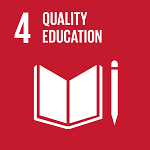
| Academic Forum "Challenges of Education and Learning for Creating and Maintaining Sustainable Society" (Japanese page) |
Subcommittee on Promotion of Education and Capacity Building for Sustainable Development, Committee on Promotion and Cooperation of Future Earth |
Sustainability programmes such as Future Earth, SDGs and ESD, are gaining momentum, and it is important for academics, the society and education, particularly at schools, to cooperate and promote them together. Let's deepen discussion on curriculum management and evaluation, regional learning practices, cooperation between schools and local communities etc. for sustainability. Anyone interested in these issues, including high school and university students, are welcome to this forum and join the reports by academics, teachers and students, and the open discussion that follows. |
| Academic Forum "Risk Perception and Education (Japanese page) |
Environmental Risk Subcommittee, Safety, Security and Risk Review Subcommittee on Engineering Systems, Food Safety Subcommittee, Toxicology Subcommittee, Veterinary Medicine Subcommittee, Environmental Philosophy and Environmental Education Subcommittee |
Although there are many opportunities to hear the word "risk" on a daily basis, in order to make the concept of "risk" a part of society as a whole, it will be necessary to provide risk-related education within the Japanese educational curriculum. This forum will discuss the need for "risk education" and methods of risk perception, based on the concept of risk, methods of risk assessment, the meaning of reference values, the current status of risk education in the training ground, and international trends. Finally, we will discuss how "risk education" should be introduced into primary and secondary education from various perspectives. |
| Design Guidelinefor Information Education Courses ---From Elementary Education to Higher Education (Japanese version only) |
|
We examined and organized the required topics in informatics and defined the Reference Standard of Informatics Education to give a consistent education flow from primary school to university. We classifiedthose topics covered in informatics education into eleven categories. Each category consists of three to five items. We defined four levels for each item and assigned the most appropriate education stage to each level. For instance, about the item “programming” fundamental success experiences in programming are gained in elementary school. Logical thinking and code construction are treated in junior high school. Practical tasks, such as problem-solving and system construction, are taught in high school. Weintend that all the education contents result in better individual life and society.
|
| Promotion of Discipline-Based Education Research (DBER) in the field of Physics(Japanese version only) |
|
In order to achieve the Sustainable Development Goals (SDGs), there is an increasing need for people who are capable and able to keep up with the times. To cope with this, it is necessary to reform and strengthen physics education in basic courses of universities. Education research based on the discipline of physics (PER) should be promoted to provide guidelines and practical methods for effective physics education reform. One of the important research issues there is to reduce the gender gap. |
How could we include various citizens in the educational system of contemporary Japan ? We offer concrete proposals under the idea of free general education of all.
| Guaranteed free general education for all residents in Japan : towards inclusion of all citizens(Japanese version only) |
|
In this report, titled “Guaranteed free general education for all residents in Japan!”, we propose a way to make the Japanese educational system more inclusive for minority groups such as foreign children and handicapped children. We discuss about what the national government, the local governments and the individual educational institutions could do for that purpose. |
| A recommendation concerning English examinations in the system of university admission in Japan (Japanese version only) |
|
Fostering English proficiency in a well-balanced manner does not require measuring “four skills” separately in English entrance examinations. If it were decided that “writing” and/or “speaking” tests in English be administered in a large-scale entrance examination like the Standardized University Entrance Examination, it would certainly result in unfairness. It is recommended that each university decide on what examinations to conduct, and how to conduct them, based on its admission policy and the curriculum it offers.
|
A Framework for Teaching and Learning Education in Universities.
| Report: Disciplinary Reference Points for Curriculum Design and Quality Assurance of University Education - Education (Japanese version only) |
Committee on Psychology and Education Subcommittee on the Deliberation of Reference Points for Education |
This document has been prepared to serve as a reference point for curriculum design and quality assurance of university programs for education, and applies to both programs for educational studies and teacher education. While teacher education is an essential element of educational studies, educational studies provide the foundation to teacher education by integrating theory and practice. Hence, it is the committee’s wish that this document be referenced when revising the “core curriculum for teacher education” already released by the national government.
Education is the act of facilitating human becoming/development and learning and of influencing the environment in which such processes take place. The education discipline represents normative, empirical, and pragmatic approaches to understanding education including their purposes, contents, methods, functions, structures, and history. By outlining the qualities, learning outcomes, and approaches to teaching, learning and assessment, this document aims to facilitate the quality enhancement of programs for education.
|
| Promoting the teaching of “thinking and argumentation” in "moral education"(Japanese version only) |
|
The special subject “Morality” was established through a partial revision of curriculum guidelines. In a society where “reasonable disagreement” takes place everywhere, a “morality of procedure” which emphasizes “thinking and argumentation” without the indoctrination of moral values, must be cultivated in primary and secondary schools. Through introducing philosophical thinking into teacher training and critically re-examining textbooks, education can help shape a democratic society which values diversity, as well as helping to remove the influence of “Shushin (pre-modern character education)”. |
| Curriculum reference for proficiency for university education: Chemistry(Japanese version only) |
|
This reference standard provides six basic principles that all students, including those who do not specialize in chemistry, should acquire. It also specifies knowledge and understanding of chemistry topics necessary to learn those principles, which are organized into 18 subjects.
As for the chemistry learning, it should be performed by acquiring knowledge and understanding through lectures and books, and also through experiments, and exercises. In particular, the report points out the importance of acquiring knowledge by comprehensive abilities through active learning such as problem solving.
Necessary knowledge of chemistry as liberal art education at the university is to provide fundamental understanding of phenomena in nature. In addition, it is essential for student majoring in chemistry to develop the ability to accurately read sentences, to logically understand the contents of the description, and to express their thoughts clearly. And to learn the mechanism of society.
|
More comprehensive history education to all
| What is expected for "Comprehensive History"(Japanese version only) |
Committee on History / Archaeology
Subcommittee on History Education in High School |
We made 10 recommendations for secondary education in the 23rd term of SCJ. Among them, this recommendation attracted particular attention. Since 2011, the Committee on History / Archaeology denied an alternative of "world history or Japan's history" from a global perspective. Students should study the past, present and future of the world and Japan subjectively and comprehensively. In response to this, the Ministry of Education, Culture, Sports, Science and Technology started moving toward establishing compulsory subjects called "Comprehensive History." We pointed out that there are still major issues in the content. |
More education for everyone to create society for everyone
| 18 years old as a citizen - reform of civic curriculum at high school aiming to cultivate citizenship - (Japanese version only) |
Committee on Psychology /Education
Subcommittee on high school civic education aiming to cultivate citizenship |
Another new compulsory subject at high school curriculum named "Public" was also proposed by a subcommittee consisting of members of pedagogy, political science, history, philosophy, law, and anthropology. It is an education that promotes "citizenship" which has advanced the "citizen" education so far, considering the diversity and subjectivity of the learning side. It is an urgent recommendation that discusses the importance of the 18-year-old voting rights and discusses what is important in education to build a democratic society together. |
More environmental education for everyone with people in society
| Toward integrated promotion of environmental education (Japanese version only) |
Committee on Ecology and Environmental Science
Subcommittee on Philosophy and Education for Environment |
Is it necessary to educate people on the importance of resources and problems of environmental destruction by industry for environmental education? That is what we have thought since the Great East Japan Earthquake. In other words, environmental education may include disaster prevention and actions after disaster. It became apparent that it is important not only to learn in school but also with people in the community. Therefore, recommendations for "integrated environmental education" were made. |
Improvement of educational environment
| Toward improvement of campus design and its maintenance system of universities in Japan (Japanese version only) |
Committee on Civil Engineering / Architecture
Subcommittee on discussion on university campus as environments evoking intellectual creation and activities |
A questionnaire was taken to universities nationwide, and many universities responded by saying that their university's campus design does not compete well internationally. Although the content of education and research are more important, the attractive campus in appearance and function also creates excellence for students both from outside and inside Japan. |
Goal 5. Achieve gender equality and empower all women and girls
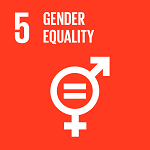
| On the Reforms of Institutions and Work Environment for the Promotion of Women's Participation in Politics (Japanese version only) |
Committee on Political Science, Committee on Law |
This report outlines key measures to address the persistent underrepresentation of women in Japanese politics, with a focus on political parties and the Diet. It recommends that political parties undertake organizational reforms to increase the number of women candidates and elected officials. One concrete proposal is to leverage political party subsidies as an incentive, encouraging parties to take more proactive steps toward gender parity. The report also calls on the Diet to review its internal structures and practices through the lens of a “gender-sensitive parliament.” This includes fostering a more inclusive and equitable political environment. A particularly urgent issue is the need for robust anti-harassment measures. The report proposes concrete institutional reforms that both the Diet and political parties should implement to prevent and address harassment, which remains a major barrier to women’s participation in politics. |
| Towards amending the Criminal Code to put "consent" at its core - reflecting international human rights standards against sexual violence (Japanese version only) |
|
This recommendation recommends that the remaining issues in the Criminal Law Amendment Act of 2017 should be reviewed in 2020. The review should be in accordance with international human rights standards, with "presence or absence of consent" at its core, and "assault and intimidation" and "inability to resist" should be removed from the requirements for the commission of a crime. It is hoped that the law will be amended to cover other items as well. In order to achieve gender mainstreaming in the criminal justice system, it is essential to provide thorough gender legal education and to improve the trial system for sexual violence cases. |
| Protection of Sexual Minority Rights (Ⅱ)――Development of Laws Seeking to Ensure Dignity of Transgender (Japanese version only) |
|
This recommendation looks at ① repealing the “Act on Special Cases in Handling Gender Status for Persons with Gender Identity Disorder” (2003) and enacting new legislation “Act to Change Legal Gender ” (provisional name) to replace it, ② calling for the enactment of human rights protection laws specializing in sexual minorities to prevent human rights violations occurring in different fields, and through ②, ultimately ③ establishing a comprehensive anti-discrimination law aimed at eliminating all forms of discrimination. |
| Current status and issues concerning gender balance in the fields of science and technology (Japanese version only) |
|
The ratios of female researchers are especially very low in the fields of science and technology. Much more active approaches are essential to accelerate gender equality. All the people have to become aware of their unconscious bias and change their mind. Then, young people can choose their careers freely in the fields of science and technology following their interests and abilities. The change in the mindset could also stop the leaky pipeline (the decline in the female ratios). To achieve the goal, approaches to people at elementary/middle and higher education, families and societies are proposed. |
More comprehensive "Gender equality"
| Toward assuring the rights of sexual minorities - focusing on marriage, education, labor (Japanese version only) |
Committee on Law,
Subcommittee for assuring the rights of LGBTI in society and education |
SDGs have established gender equality achievement, but there is no direct description on sexual minorities (LGBTI). Because there are countries legally and socially negative to homosexuality in the world, they could not make consensus. This recommendation is based on the current situation that in Japan many people have various difficulties in social life and school life even though 8% of people are regarded as sexual minority. We proposed establishment of the law for dissolution of discrimination. |
Keeping encouraging "STEM girls"
| Measures to expand women's participation in the scientific community (Japanese version only)
|
Committee for the Scientific Community
Subcommittee on Gender Equality |
Basic Act for Gender Equal Society was established in 1999, and recently there has been a boom of STEM girls. However, Japan still has the lowest level female ratio of researchers in the OECD. The reason was thought that the various efforts to promote gender equality were scattered, and it was found that there was insufficient data collection and verification. We made recommendations for them. To reflect The Fourth Basic Plan for Gender Equality 2015, we called for the establishment of specialized agencies with the authority to organically link the related initiatives. |
Goal 6. Ensure availability and sustainable management of water and sanitation for all
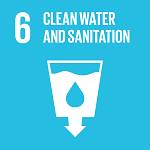
As a hub of Asia of the headquarters
| Toward Realizing a Sustainable Global Society - Promotion of Future Earth (Japanese version only) |
Committee for Promoting the Future Earth Initiative |
Although it is hard to notice it in Japan, the global environmental problem of "water" directly linked to life is one of the most important issues. "Future Earth (FE)" is an international project that has been newly established to deal with global environmental problems including water problems. One of the five international headquarters secretariat of FE is in Japan, and the scientific conference is in charge of its operation. In this recommendation, we call on FE promotion in Japan to all scientific communities and stakeholders (policymakers, companies, local governments, media, education officials, citizen groups, etc.). |
Goal 7. Ensure access to affordable, reliable, sustainable and modern energy for all

| Progress and challenges in studies of environmental contamination caused by TEPCO Fukushima Dai-ichi Nuclear Power Station accident (Japanese version only)
|
|
During past nine years since the nuclear accident of the TEPCO Fukushima Daiichi Nuclear Power Station, investigations and analyses of environmental release, kinetics and impacts of radioactive substances have made a significant progress. This report provides an overview of environmental pollution studies undertaken by a variety of academic fields, scientific societies and many institutions. The report also sorts out remaining issues for further studies and compiles lessons and ideas for the future, including long-term archives of records and materials, improvement in radiation education, as well as needs for comprehensive reporting of environmental pollution. |
Current Issues and Future Prospects of Nuclear Regulatory Organization in Japan (Japanese version only)
|
|
In order to promote the continuous improvement of safety at nuclear facilities, summarized the issues that need to be reformed for the regulatory body, together with operators and stakeholders, and made eight recommendations that should form the basis of the direction for solving them.
This can contribute to the SDG to develop high quality, reliable, sustainable and resilient infrastructure to support economic development and human well-being.
|
Quantum Jump of High Energy Density Science with Powerful Laser Technology and Creation of New Industries (Japanese version only)
|
|
Powerful lasers have been playing important roles in solving various public and academic issues including energy and environmental issues. Recently, the powerful laser technology is jumping up to a new state of the art, so that the high energy density sciences progress rapidly and new industries using powerful lasers are widely coming up in the world. Therefore, we propose to build and operate a new central research infrastructure that realizes quantum jump in powerful laser technology and high energy density sciences and activates the research network for powerful laser technology and high energy density sciences and inspires and train young scientists and engineers who will be international players in the science and technology. They will contribute to opening up the academic frontier of the world and the creation of new industries. |
Acceleration of innovation for long-term deep emission reductions of greenhouse gases (Japanese version only)
|
|
Response to climate change risk is one of the most urgent issues, but GHG emission reductions have not been successful globally. Enhancing predictability of return on investment in energy infrastructures for low- or de-carbonization, increasing renewable energy deployments without large energy cost increase to avoid economic burden, and increasing electrification ratio are keys for climate change response. As well as development of de-carbonization technologies, policies to induce various kinds of innovations through widely strengthening basic research and technology development such as information technology are necessary even for climate change mitigation. Sustainable development can be simultaneously achieved when these policies and measures are implemented successfully. |
Clean and safe energy for everyone
Long-term perspective on the use of renewable energy (Japanese version only)
|
The Great East Japan Earthquake Recovery Assistance Committee
Energy Supply Subcommittee |
Based on our experience of the Fukushima nuclear accident, we recognized that Japan's energy supply and demand plan was forced to undergo fundamental change, and repeatedly considered to expand the introduction of renewable energy that does not emit carbon dioxide. Solar power generation, wind power generation, biomass power generation, geothermal power generation, hydroelectric power generation, marine energy utilization are analyzed respectively, including hydrogen energy for storage and transportation, in this report. |
Avoiding "damned if you do, damned if you don't" energy policies
Direction of policy for Japan's energy and global warming countermeasures based on the Paris Agreement (Japanese version only)
|
Committee on Comprehensive Synthetic Engineering
Subcommittee on energy-related science and technology |
The Paris Agreement is an international agreement that established a framework of greenhouse gas emission reduction that came into effect in 2016. Approximately 67% of greenhouse gas emissions in the world are emissions from energy, which is about 84% in Japan. Everyone knows that energy saving is important, but how can we make measures while paying attention to cost effectiveness? We discussed the issues from the viewpoint of energy mix, considering the balance of S + 3E (safety/security + energy security/stable supply, economic efficiency, environmental friendliness). |
Goal 8. Promote sustained, inclusive, and sustainable economic growth, full and productive employment and decent work for all
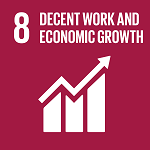
| The proposal to generate the active and vibrant super-aged society: The future direction of medical science, practice and the society in Japan(Japanese version only) |
|
Japan is now entering the era of a super-aged society both on an unprecedented scale and at extraordinary speed. This proposal advocates the creation of new knowledges regarding the future vision from not only a viewpoint of individual health but also its environment and community. Initially, we should introduce a paradigm change from only “cure” to both "cure and life support" regarding medical care for older people. In addition, it is necessary to promote comprehensive approaches to prevent/improve frailty in older people, and especially we should consider the change in concept of nutritional management for older people from “against metabolic syndrome” to “against frailty”. Furthermore, countermeasures for polypharmacy are urgent in the pharmacotherapy. Finally, the viewpoint of community development (i.e. re-designing) is also necessary towards a creation of the community where people live side by side through cooperation among industry, academia, public administration, private sectors and citizens. |
| Current Status and Prospects on Qualification Education in Clothing Science(Japanese version only) |
|
Textiles advisers are the only qualifications that can be trained through clothing education. This qualification is an important and useful qualification that contributes to improving the quality of clothing life from the viewpoint of lives. Specifically, the Textiles adviser can provide the consumer with information regarding the quality of the product and the handling labels to support the safety and comfort of clothing life. On the other hand, it is possible to provide the producer with information based on the product test results and reflect the information in the development of better products that consumers need and have a low environmental load. We conducted a questionnaire survey on training universities and their graduates, analyzed the current status of the qualifications of textile advisers, and proposed prospects of the 1st grade textiles advisor qualifications. |
| Promoting Area Studies in a World in Turmoil: Strengthening the Network of Institutions, Experts, Scholars and Students (Japanese version only) |
|
As stated in the SDGs, the problems confronting today’s world arise out of both global and local contexts. As such, area studies specialists, who integrate their knowledge of local societies with a variety of academic disciplines, are in dire need. There are various obstacles confronting the field of area studies in Japan, however, since specialists are dispersed across the country and educating the next generation of experts is becoming increasingly difficult. In order to confront this challenge, we propose to strengthen the network of institutions, experts, scholars and students engaging in area studies. Such a network will enable us to launch joint educational programs for the next generation; jointly promote and publicize research results around the world; create a system for sharing various resources (expertise, data, historical records, etc.); expedite international cooperative projects; and establish a durable institutional framework for area studies. |
| Toward creation of new chemistry through the fusion of chemistry and information science(Japanese version only) |
|
It is important to educate human resources capable of responding to environmental changes in chemistry where AI is introduced, and to ensure their equality. Introducing AI to production factories not only improves productivity and safety, but also promotes worker’s diversity, which in turn leads to work style reforms. Through such technological innovation with AI, it is possible to achieve both the solution of energy and climate/environment problems and economic growth. In a society where many stakeholders share information, both industries (suppliers) and citizens (users) become aware of their responsibilities. |
| Enhancing social and research environments to facilitate breakthroughs in Japan’s stagnation and the creation of new industries-Recommendations from Applied Physics-(Japanese version only) |
|
Applied physics is an academic field that stands at various intersections, such as the intersections between industry and academia, science and engineering. In particular, the field plays an important role as a bridge between the fruits of fundamental physics and new industries. Recently in Japan, however, there are growing concerns about stagnation or degradation of both science/technology and industry. In this recommendation, we emphasize the importance of the following; reducing the time cost of evaluations in order to save the time that should have been used to produce research outcomes, supporting a greater diversity of research personnel for the creation of new industries, accelerating personal interchanges between industry and academia, developing innovation eco-systems among regional networks of industries and universities. |
Challenging work anywhere in Japan
| For a sustainable and systematic regional development in the society in the era of declining population in Japan (Japanese version only) |
Committee on Area Studies
Subcommittee on Human/Economic Geographies, Subcommittee on Geoinformatics |
It is said that young people concentrate in Tokyo area because there are few attractive jobs in peripheral areas. Town, people, work creation headquarters in the government are planning and implementing various measures for the purpose. However, we saw that it was not going well, and made recommendations that included verification of regional creation relationship grants, utilization of information for policy planning, flexible regional cooperation, and so on. |
Worthwhile work experience with work-life balance
Report on the regulation of working hours(Japanese version only)
|
Committee on Economics
Subcommittee on Work-Life Balance Research |
Long working hours of full-time workers in Japan has lead to creation of karoshi, death due to overwork. The government has introduced the "Working Reform Execution Plan" in 2017 March to put a ceiling on overtime work hours. In our report, we recommended that an overtime work hour ceiling should cover holiday work. We also recommended mandatory rest hour of eleven hours after a work day. Further measures are necessary to improve work and life balance of workers. |
Goal 9. Build resilient infrastructure, promote inclusive and sustainable industrialization, and foster innovation
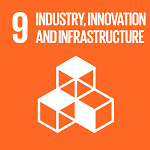
| Academic Forum "Toward the realization of “Future Academic Advancement Initiative (2023)" (Japanese page) |
Subcommittee for the Promotion of Academic Research under the Committee for Scientific Community |
We will share the contents of the recommendation on “Future Academic Advancement Initiative (2023)”issued in 25th SCJ, and discuss what activities should be carried out to realize the proposal and what could be done to enrich this concept. Discussions will be held by experts from various departments in SCJ and external experts. |
| Reconstitution of the scholarly information environment to maintain global competitiveness in the age of electronic information dissemination (Japanese version only) |
|
Regarding the forthcoming greatest revolution in a decade around the dissemination of scholarly information, this recommendation proposes reconstituting a scholarly information environment for electronic journal subscriptions and journal publishing, from old and widely dispersed organizations to a new system to maintain the global competitiveness of science and engineering areas. This recommendation also proposes i) establishing three new corporations and one center to manage journal subscription contracts for a national site license with a fixed article processing charge, ii) providing support for a new flagship journal publication and quality enhancement of journals published by Japanese academic societies, and iii) establishing an open data repository to support the open access policy of societies. The proposed transformations are organized by reconstituting current organizations and redistributing dispersed supporting funds from various sources. |
| Recommendations toward Promotion and Deepning of Open Science(Japanese version only) |
|
This proposal captures open science, which can change the way of science in the future as is symbolized by data science, from a comprehensive viewpoint centered on data. It promotes the sharing of research data and clarifies the importance of a platform for sharing research data. It discusses the importance of maintaining the balance of cooperation and competition according to the characteristics of data and maintaining the spirit of data sharing that drives and transforms data science in the present age when data is regarded as an extremely important asset. |
| Proposal on Revision and Improvement of Public Interest Corporation Act, related to Academic Societies (Japanese version only) |
|
The new act on Public Interest Corporation started in 2008, and many large academic societies transferred to general incorporated or public interest incorporated associations. The act has been effective partly to improve the transparency of the management of associations. However, the act has provided many negative effects on the management of academic societies. This proposal is “the revision and improvement of the operation of the act regarding the academic societies”.
This proposal also requires “the accounting rules for cooperative body of academic societies”, “the system for reserve fund for preparing international conference which is managed by the cooperative body of academic societies”.
As mentioned above, we propose the improvement of the systems surrounding academic societies for the development of Japanese science and technology. |
Opening a new era
| Perspective of university reform based on university-industry cooperation (Japanese version only) |
Committee for Science and Society
Subcommititee on Academic Collabotation with Government and Industry |
Currently, various government committees are deliberating and formulating plans to reform Japan's universities, with a new focus on industry-university cooperation. There is increasing demand for universities to cultivate human resources for innovation to increase the international competitiveness of the industry. Aiming toward "a society where people solve various social issues and create new value by sharing and consolidating knowledge rather than resources and goods," they have examined university ideals and are presenting some direction for reform. |
More efficient and effective way of large shared use research facilities
| Desirable plan of research reactors for suppling neutrons to research and industry sectors (Japanese version only) |
Committee on Comprehensive Synthetic Engineering
Subcommittee on Nuclear Safety |
After the governmental decision to decommission the Japan Material Test Reactor, there is no reactor for studying the safety condition of materials and each system used in a reactor. The recommendation pointed out that the most urgent subject is construction of a reactor suitable for neutron irradiation. The second most urgent problem is improving neutron delivery lines and experimental equipment of Japan Research Reactor III. The third is ensuring a fair share of the financial burden among relevant ministries. |
Appropriate evaluation of the intellectual creativity of the creator
| Legal development in the selection of intellectual producers in public procurement - Revision of accounting law and local autonomy law to create beautiful environment (Japanese version only) |
Committee on Law, Committee on Economics, Committee on Civil Engineering / Architecture
Joint subcommittee on discussion on public purchase of intellectual producers |
We remember that the design of the new National Stadium has been involved in some controversy, but in many cases the design of public facilities are determined not by such competition but by price competitive bidding. In other words, the cheaper ones are adopted. The creators lose motivation and the quality declines with this way. Therefore, in cooperation with law scholars, economists, civil engineers and architects, we refer these creators as "intellectual producers" and propose legislative reforms to stop price competitive bidding. |
Great manufacturing country again
| Issues and prospects of manufacturing human resources development from the viewpoint of materials engineering (Japanese version only) |
Committee on Materials Engineering
Subcommittee on Forward Development of Materials Engineering |
People call Japan a "manufacturing country", but there was a pitfall. Japanese are good at creating superior materials, but not so good at fabricating finished products. For example, US companies make profits on aircraft equipment assembled using fine ceramics produced by Japanese. Such weakness of Japanese product planning is attributed to low capability of design conception. To improve this weakness, manufacturing human resources development should be established through academic-industrial collaboration, revised university education curriculum, public awareness campaign to high school students, and an increase in female researchers and engineers. |
Goal 10. Reduce inequality within and among countries
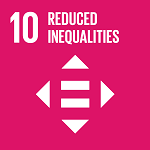
| Academic Forum "Living with the Coronavirus Disaster #8 How do the various "working" issues revealed by the Covid-19 pandemic affect population problems?" (Japanese page) |
Study Committee for Solving Problems in a Society with a Shrinking Population |
The coronal pandemic that began at the end of 2019 is still not over after more than two years. The direct demographic impact of the coronal pandemic will have to be analyzed in the future, but there are concerns about the indirect impact of the manifestation of various disparities within society. One of the most significant concerns is that the labor situation of people in precarious positions will be further exacerbated by the Covid-19 pandemic, both in terms of excessive labor demand for essential workers and employment reductions in service-related industries. This forum will focus on the issue of "work" and will examine the multifaceted challenges of a shrinking population in a post-Covid-19 society, while taking into account the tense international situation and immigration issues. |
| The Role of Science in Dementia---For the Symbiosis and Prevention(Japanese version only) |
|
The number of people living with mild cognitive impairment and dementia is set to rise sharply as Japan’s aging society continues to accelerate. This will pose a heavy burden on Japanese communities. To date, multiple policies and strategies to tackle dementia have been proposed by the Japanese government and scientific communities. The Science Council of Japan releases its first communique on the care and support for those living with dementia. Comprehensive proposals include 1) Developing an inclusive society for those living with dementia, 2) Integrating a novel interdisciplinary “care science” to prevent and care for cognitive impairment and disability, 3) Developing an innovative, new business model for a sustainable society to include those living with dementia, 4) Continuing to search for ways to treat dementia, such as Alzheimer’s disease, with the aim of finding a cure, 5) Developing sustainable healthcare system based on the effective social cost estimations. |
| Construction of medial care system and human resource development for promoting genomic medicine(Japanese version only) |
|
Efforts are being made to promote "genomic medicine" that enables more effective and efficient diagnosis, treatment, and prevention of diseases that are suitable for the constitution and medical condition based on the individual genome information. It is required not only to establish a research base for genomic medicine, but also to construct a medical care system that can carry out sufficient genetic counseling, not just by organ, but across departments. It is necessary to link with the activities of the academic societies that have already been implemented and it is important that the genetic counselor be nationally qualified. |
| Concerning ethical justification for applying genome editing technology to human reproduction (Japanese version only) |
|
Germline genome editing has been suggested as a procedure that can prevent future children from inheriting a disease, as well as a treatment to overcome infertility. However, it is doubtful that prospective parents sufficiently understand the medical risks and ethical problems associated with germline genome editing. The ethical issues associated with the applications of germline genome editing with regard to human reproduction, is one of the most contentious debates in current international science policy, about which, more philosophical perspectives need to be considered. Issues regarding reproductive medicine, especially issues regarding the expansion of the use of assisted reproductive technology, and choice regarding quality of life, need to be debated. Problems concerning eugenic thought, such as the right to autonomy, as well as the invasion of the female body and our responsibility to future generations, also need to be discussed. |
elimination of economic inequality
Recommendation for Building the ‘inclusive society’ (Japanese version only)
|
Committee on Sociology/Social Welfare , Committee on Economics,
Joint subcommittee on
Promote Social Policy Toward Inclusive Society |
The in-work poverty and deterioration of working conditions, including long working hours, have become huge social problems in Japan. This document recommends to the Japanese government to reformulate its social and labor policies to incorporate the principle of "social inclusion" at its core, and suggests actual reform ideas in its social security, public assistance, education, and labor systems. |
Support for nuclear disaster victims
| Recommendations on the status of municipality residents of evacuees of the nuclear disaster caused by the Great East Japan Earthquake (Japanese version only) |
The Great East Japan Earthquake Recovery Assistance Committee
Subcommittee on health effect assessment, health management and medical care following the Fukushima Daiichi Nuclear Power Plant accident |
Evacuees of the Fukushima nuclear accident should not be forced to select either returning to the original home town or completely moving to other places. SCJ recommends keeping a "designated municipality" for the time being, under the Nuclear Power Plant Evacuees Special Law, and proposes to establish a system that allows evacuees to maintain ties with both evacuation sources and destination municipalities. Having possible similar cases in mind, the Japanese government should develop new systems such as ‘ Special Residents ’ for people who keep resident registration in the original municipalities and ‘ Specific Relocated Residents ’ for those who transferred registration. |
Goal 11. Make cities and human settlements inclusive, safe, resilient, and sustainable
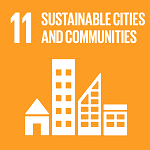
| Academic Forum“How to build resilience to overcome upcoming catastrophic disasters which may ruin our country” (Japanese page) |
Subcommittee for IRDR, Committee for Civil Engineering and Architecture |
In order to overcome upcoming mega-scale catastrophic disasters, the Forum will integrate inter-disciplinary and trans-disciplinary knowledge and discuss overarching strategies and feasible concrete measures (what to be done before and after such disasters) from an academic perspective. The outcomes of the Forum will be fed into an SCJ Recommendation in the 25th term. |
Examining the Recovery Process through Reflexive Governance
| Societal Monitoring and Archiving: Reflexive Governance in the Appraisal of Recovery (Japanese version only) |
Committee on Sociology/Social Welfare
Subcommittee on Social Monitoring and Reconstruction after the Great East Japan Earthquake |
It has been nine years since the Great East Japan Earthquake, but many people are still unable to return to their homes.
We discussed whether appropriate policies are in place to ensure adequate compensation and return to their homes, from three perspectives: reflexive governance, social monitoring, and archiving. The starting point is to ensure that people can continue to live in their homes with adequate health and welfare despite the disaster, and to build partnerships with as many people as possible to develop a city that looks to the future. |
| Laying the Foundation for Care Science and Shaping the Future of World's Society(Japanese version only) |
|
Modern society is facing care-related problems due to an ageing and declining population, and large-scale natural disasters, that cannot be addressed by a single academic discipline. In order to respond to these problems, this proposal advocates the creation of a new system of knowledge, "Care Science." Care Science is based on mutually complementary relationships, and will build a community of care through the collaboration of diverse academic disciplines, citizens and government. To realize the social implementation of care science, we propose strategies for human resource development, laying the foundation and social practice.
|
| Facilitating nursing science and society collaboration to implement the development of home community-based nursing(Japanese version only) |
|
In modern society, population decline and uneven distribution, and low birthrate and aging are advancing. The issue of healthcare and welfare is difficult to solve by nationwide uniform measures. It is expected that the local/home-community residents will independently and autonomously create measures for each issue according to each region. This local/home community is under the community-based integrated care systems. In this proposal, nursing universities and local/home communities nationwide will work together to generate and develop a new field named “home-community-based nursing.” We propose that the nursing communities should promote the participation and cooperation of the local/home community to resident, the governmental and administrative parties. We also propose that all units involve policy development, social system designing, and model construction to each local/home community.
|
| Enhancing Coordinated Multidisciplinary Support and Health Care for Persons with Developmental Disorders(Japanese version only) |
|
The management of developmental disorders in the community is an important issue worldwide. Considering their high prevalence rate, serious impact on individuals, families, and society, coordinated multidisciplinary support is essential. In order to facilitate the implementation of a care system, this proposal advocates that the government scale up effective management by integrating a coordinated multidisciplinary support component under the Basic Law for Child and Maternal Health and Child Development.
|
| Creating “Inochi-machi”: National Spatial Development, utilizing Green Infrastructure against Disasters intensified due to Climate Change(Japanese version only) |
|
The purpose of this proposal is to create “Inochi-machi” based on National Spatial Development,utilizing Green Infrastructure(GI) against Disasters intensified due to Climate Change.We defined GI as follows. GI is the social Overhead Capital, which would be formulated by the strategic planning, utilizing natural environment, historical cultural assets. It would contribute to enriching bio-diversity, resilience to natural disasters, and protect lives of people and maintain the sustainability of the earth. Two main proposal have issued. The first is “the Strategic Planning of GI in Metropolitan Tokyo Region”, and the second is to create the Multi-Structure Disaster Preventing System based on the eco-system along the seashore areas.
|
| Social Issues of Autonomous Cars - Social Design with New Mobility (Japanese version only) |
|
Currently, as our society is about to change drastically, it is expected that autonomous cars would make a significant contribution for realizing safely sustainable cities and communities where people can move freely. However, it may lead to distrust if the autonomous cars are not properly understood. Therefore, we discussed the autonomous cars from various perspectives including not only technological development but also humanities and sociology. As a result, we propose the role of the autonomous cars as a new mobility service in the future society. We also propose human-centered designs of the autonomous cars and so on. |
| How can we reduce vulnerability of local communities in the era of intensifying disasters? (Japanese version only) |
|
This recommendation announces important things to establish resilient society, which can recover from the damaged situation when hit by natural disasters, considering the following five items: 1. Realizing measures to avoid "unexpected" assuming severe disasters and multiple disasters, 2. Improving citizens' knowledge and literacy for how to cope with natural hazards and deal with information for disaster prevention and mitigation, 3. Building up resilient disaster mitigation society based on low birthrate and aging population, 4. Setting up regional safety goals and BCP (business continuity planning) with BCM (business continuity management), 5. Enhancing education for disaster risk reduction. This contributes to SDG 11, aiming to improve and empower local communities as resilient and sustainable society, which can effectively cope with various natural hazards such as earthquakes, tsunamis, floods and landslides. |
City where we can continue living even if an earthquake occurs
| Toward disaster-proof mega cities (including earthquakes) (Japanese version only) |
Committee on Civil Engineering and Architecture
Subcommittee on disaster mitigation of mega-cities against huge earthquakes |
Tokyo is one of the largest cities in the world, and is the capital of Japan, a heavily earthquake-prone country. The Japanese population and much of its functionality are highly concentrated in Tokyo. Since the Japanese government may be unable to respond properly following such a major disaster, countermeasures should be carefully prepared. These countermeasures shall focus not only on post-earthquake recovery, but also on a long-term seismic-resisting strategy accompanied by drastic structural changes to the city aimed at reducing risk. These efforts shall be carried out cooperatively by various groups, such as individuals, families, companies, municipalities, and the government. |
Delivery of scientific achievements to society for disaster reduction
| Promotion of cooperation and co-creation by science and society toward reduction of disasters and formation of a sustainable society (Japanese version only) |
Committee on Earth and Planetary Science
Subcommittee for Human Geoscience |
Many scientists in Japan are doing research aimed at alleviating disasters and forming a more sustainable society. However, good research does not always reach society, nor is it justly appreciated by society. We recommend provision of the places for cooperation and co-creation of science and society toward reduction of disasters, provision of the opportunities for education and learning that form their bases, and further development and release of the regional information useful for reduction and mitigation of disasters. |
Deliver our discussion to the world further
| Disaster Risk Reduction and Promotion of International Research on Disaster Prevention and Mitigation – Recommendations for Implementation of the Sendai Framework for Disaster Reduction and Tokyo Statement |
Committee for International Affairs
Subcommittee for the Tokyo Conference on International Study for Disaster Risk Reduction and Resilienc
Committee on Civil Engineering / Architecture,
Subcommittee for IRDR |
We would like to achieve disaster prevention and disaster reduction all over the world through international cooperation as well as in Japan. The SCJ held its "Tokyo Conference for International Studies on Disaster Prevention and Reduction" in January, 2015. By presenting the results of the discussion here to the "Tokyo Declaration" and "Tokyo Action Guidelines" to the international community, the importance of science and technology in the "Sendai disaster reduction framework" was adopted at the United Nations World Conference on Disaster Reduction in March of the same year.. This proposal summarizes these discussions and comprehensively presents the matters to be implemented in cooperation from all over the world in terms of science and technology, the implementing body and concrete activities, and actions to be taken by Japan. |
Goal 12. Ensure sustainable consumption and production patterns
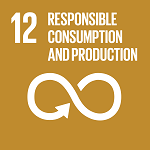
| Academic Forum“A multifaceted approach to Anshin-kan” (Japanese page) |
Subcommittee on Safety, Security, and Risks Related to Engineering Systems, General Engineering Committee and Mechanical Engineering Committee |
These days, the social situation is more uncertain than ever before such as COVID19 pandemic, extreme weather conditions, invasion by other countries, threats to use nuclear bombs, and harmful rumors after the Fukushima accident. On the other hand, the social implementation of new technologies, such as automated driving in road traffic, and measures to curb global warming require that the technologies and measures be accepted by society. Here, it is important to be "justifiably afraid," as Torahiko Terada said, rather than feeling secure rooted in ignorance through the "know-nothing" measures of the Edo period.
In this forum, researchers from various fields of expertise will introduce examples and ideas on science and technology necessary to realize a society in which people feel secure, as continuously stated in the "Basic Plan for Science and Technology" (the "Basic Plan for Science, Technology and Innovation" from the 6th period), to clarify the components of a sense of security. By clarifying the components of the sense of security, we will discuss the ideal society in which people feel secure. |
| New mechanism of social safety target for engineering systems (Japanese version only) |
|
In order to create safe society, it is necessary to set concrete goals that can be shared by society in addition to safety by regulation, check the progress of safety measures, and verify achievement of the goals.
This proposal proposes a new mechanism for setting safety goals in engineering systems and ensuring the safety of society, and aims to realize it. In this proposal, we organized the concept of safety and examined how to set goals for society and how to evaluate them. |
| “Sense of security in engineering systems” and society (Japanese version only) |
|
Japanese word "anshin" is often used together with “safety” in Japan. However, while there has been much discussion about the importance of “safety,” there has been relatively little discussion about “anshin.” Nevertheless, even if an engineering system is safe, it cannot be accepted by society unless it is “anshin” or a sense of security can be obtained. Therefore, “What is anshin?” or “What is a sense of security?” is a major social issue. This report is the result of this discussion. |
| Understanding and human resource development of Robot / AI for improved future society (Japanese version only) |
|
It is expected that the combination of robots and artificial intelligence (AI) will lead to great changes in future society. However, in order to create a prosperous future, it is important to have a clear understanding of both robots and AI, and to use them appropriately. In this paper, we first describe the differences between robots and AI, the current state of the art, and issues that remain to be solved. Next, we propose an approach for improving human understanding of a society that integrates robots and AI, and methods for fostering researchers in this area. |
| The Role of Serviceology in Building a Sustainable and Productive Society for Individuals (Japanese version only) |
|
In the service-oriented society, citizens are not only consumers of services, but also providers of various services such as sharing services and crowd funding. We have to evaluate the value of services in terms of their impact on communities, societies and the global environmental problems. This proposal introduces the key concepts and educational methods of “Serviceology”, and describes the roles and necessary structures of citizens, industries and governments in building a sustainable and productive service-oriented society. |
| A Proposal for a Reliable Recovery Action on the Data Falsification Problem of Base Isolation and Vibration Control Dampers(Japanese version only) |
Committee on Civil Engineering / Architecture |
After the devastating earthquake disasters in Kobe, Japan in 1995, base isolation and the dynamic control technology were applied in more buildings and bridges. However, data falsification problems of base isolation devices and vibration control dampers appeared. This problem seems to have occurred because performance checks and quality control of the product were left to the manufacturing companies’ own inspection processes.
The following reliable recovery actions to prevent any incidents are proposed to make stronger, more resilient structures and society:
1. Third-party sampling inspection should be required to avoid data falsification and ensure structural safety.
2. Dynamic loading test apparatus for full-scale devices should be introduced to comply with global standards.
3. A jointly owned, designated inspection agency with a large-scale dynamic testing facility should be established to perform the unbiased third-party sampling tests. |
For our future without excessive expectation and misunderstanding technology
| Toward the future we want with automated driving – Understanding the current situation, seen from academia – (Japanese version only) |
Committee on Comprehensive Synthetic Engineering, Committee on Mechanical Engineering
Subcommittee on Safety, Security and Risk in Engineering Systems |
Although expectations for automated driving are increasing, negative aspects such as traffic accidents have not yet been solved. This problem will be more serious in the aging society. We need to understand properly the current state of automated driving technically and legally from the perspectives of both consumption and production, and recommended a new system of industry, government, and academia collaboration from a long-term perspective. |
Realization of Society 5.0 supported by science and technology created together with society
| Recommendations on biomaterials research supporting medical care (Japanese version only) |
Committee on Materials Engineering
Subcommittee on Biomaterials |
It is necessary to facilitate biomaterials research, which plays a key role in realizing smart medical care in Society 5.0. Here, we made proposals on the establishment of novel educational systems and the human resource development that can implement innovative ways of thinking into each individuals to lead basic research and practical applications in the global field of biomaterials. |
Goal 13. Take urgent action to combat climate change and its impacts

| Academic Forum "Addressing Global Warming from the Perspective of the Food System" (Japanese page) |
|
In recent years, various studies have clarified the impact of the entire food system on global warming. The food system includes the entire supply chain from food production, processing, distribution, consumption to disposal. The forum aims to share with the community the multi-sectoral efforts being made to achieve carbon neutrality through the personal theme of “food.” Additionally, the forum will also explore the potential avenue for collaboration between industry, academia, and the public in research and development efforts to tackle the challenge of global warming. |
Recommendations on the Planning for Japanese Satellite Earth Observations in Human Sustainability Infrastructure (Japanese version only)
|
|
Highest availability of the satellite earth observation must be pursued as a basic component of infrastructure to minimize damages from the increasingly frequent and severe natural disasters associated with the climate change, and to keep the human society sustainable. Japan should also fulfill its responsibilities in the earth observations. Here we recommend 1) a solid recognition of the satellite earth observation as a necessary infrastructure for sustainable human society, 2) strategic planning of the satellite earth observations, 3) establishment of the observational data archive system, and 4) human resource training for earth observations. |
Approach to de-carbonized healthy home in ageing society (Japanese version only)
|
|
In Japan we are faced to the rapid changes in the social environment such as ageing, population decline, and household composition change. It is necessary to realize decarbonize home that is different from measures that assume growth. We discuss and propose recommendations concerning followings. The energy consumption of elderly homes, trends in energy demand, information and services, avoiding from cold homes, reducing mortality due to poor insulation, responding to heavy snowfall, housing resilience measures against the summer heat wave, strategies of zero energy house and life cycle decarbonize home, and cooling and international cooperation in hot and humid regions in Asia. |
Critical issues in promoting adaptation measures for catastrophic hydrological disasters in low-lying lands (Japanese version only)
|
|
Climate change has contributed to an increase in the intensity and frequency of hydrological disasters. Mutual cooperation in the social community is desperately required for disaster mitigation in addition to development of engineering methods for disaster prevention. The key to wiser disaster management is for society as a whole to have a proper understanding and recognition of hydrological disaster risks. In this statement, (1) methods for identification and recognition of disaster risks in the social community are proposed, (2) urgent tasks for decreasing disaster risks that have scarcely been undertaken are specified and strategies for promoting them are proposed. |
Revised Road Map for Earth and Planetary Science Research in 2020 (Japanese version only)
|
|
The Earth and planetary sciences are not only of academic importance, such as the origin and evolution of the solar system, the earth, and life, but also deeply related to social issues such as the global warming, safety and security, and SDGs. This report “Revised Road Map for Earth and Planetary Science Research in 2020” is an academic dream of scientists. To show it to society and the public is to fulfill the responsibilities of the scientists, and to provide an opportunity for the scientists and the people to discuss together while gaining a broad understanding of the society and the people. |
Linkage of climate change measures with aging society measures
| Path to urban and architecture with low carbon and healthy lifestyle (Japanese version only) |
Committee on Ecology and Environmental Science, Committee on Civil Engineering / Architecture,
Subcommittee on Pathway to Low Carbon and Wellbeing Society with Lifestyle and Consumer Behavior |
Reducing CO2 emissions for climate change and global warming countermeasures is a serious obligation for those involved in cities, buildings, and transportation. In Japan, the railroad system was established during the economic growth period of the Showa era and its population inflows into the city. It was once honorable in the world in terms of CO2 emissions, but now we need a new policy to shift to a super aging society. Recognizing the problem that elderly people and children need places where they can rest and relax, and that we have to realize further lower carbonization of traffic in small and medium cities, we propose four concrete items. |
Goal 14. Conserve and sustainably use the oceans, seas, and marine resources for sustainable development
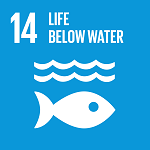
| For the development of frontier artifact engineering that opens the future of human beings (Japanese version only)
|
|
Frontier artifacts in aviation, space, and oceans are large-scale systems that require scientific development as well as international political and economic considerations. For its development, it requires the development of new academic technologies, logic and social consensus as a national enterprise. Proposals on development of scientific methods such as national policy making and project evaluation, strengthening of industrial base for realizing new technologies such as AI (Autonomous Intelligence) and frontier artifacts, human resource development, outreach and international cooperation were made. |
Promoting the water industry with protecting various creatures in the sea
| Sustainable fisheries in Japan - An ecosystem approach for fishery management (Japanese version only)
|
Committee on Food Science
Subcommittee on Fisheries Science |
Although the sushi boom is global, Japan's fisheries production decreased to 4.4 million metric tons in 2016 from its peak of 12.8 million metric tons recorded in 1984. This decrease is caused by various factors such as aging fishermen, dwindling domestic consumer demand for fish, and so on. This recommendation focuses on the problem of fishery resource depletion, proposing that ecosystem approach for fisheries management should be introduced and scientific monitoring of the ocean should be continued. |
Support research for the oceans, sea and marine resources
Securing navigation days of research vessels indispensable for the promotion of Japan's marine science (Japanese version only)
|
Committee on Earth and Planetary Science
Subcommittee for SCOR (Scientific Committee on Ocean Research) |
Understanding complex marine processes is very important from the perspective of reliable prediction of our future environment. It is also crucial for securing living/non-living marine resources, conserving ecosystems, and preventing natural disasters. Despite the importance of training scientists engaged in marine science, navigation days of research vessels for that purpose have decreased by half in the past five years. This means that the practical training period for young marine scientists has decreased drastically. We sounded a warning on this kind of situation in our country. |
Goal 15. Protect, restore and promote sustainable use of terrestrial ecosystems, sustainably manage forests, combat desertification, halt and reverse land degradation, and halt biodiversity loss
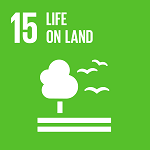
| Current status and issues on urban soil(Japanese version only) |
|
Urban soils include soils under urban land use such as building lot, roads, commercial areas, industrial areas, city parks, green space, and recreational areas. They contain various kinds of wastes, dredged soil, etc. They grow vegetation in city parks and on road slopes, while they are hardened under buildings and roads, etc. and are different from soils under natural land use. For the purpose of soil conservation and future land conversion, it is desired to prepare site development history, monitoring of soil properties and scientific soil classification of the urban soils. |
| Promotion of wood utilization in architecture as a countermeasure against global warming(Japanese version only) |
|
Enhancing carbon sinks of forests and urban areas is one of the viable options to achieve the Paris Agreement. Promotion of wood use in the mid to high-rise wooden buildings can enhance the carbon sinks in urban areas. In order to accelerate the use of wood in architecture, we firstly recommended the necessity to promote sustainable and sound forestry development by ensuring the adequate supply and use of wood, which depended on close cooperation between forestry and forest products industry by sharing forest resource information. Furthermore we recommended the necessity to develop wooden structural materials suitable for mid to high-rise wooden buildings and their standard certification system, innovative construction technology, and to introduce the environmental load evaluation index suitable for wood materials. |
Coexistence of cost burden and promotion of genetic research for protecting biodiversity
The treatment of Digital Sequence Information with Respect to the Convention on Biological Diversity and the Nagoya
|
Committee on Basic Biology, Committee on Integrated Biology, Committee on Agricultural Science, Committee on Basic Medical Science
Genetic Resources Subcommittee
Committee on Agricultural Science, Committee on Food Science
Nagoya Protocol Implications on Agricultural Science Review Subcommittee |
To achieve the objectives of the Convention on Biological Diversity and the Nagoya Protocol, prompt registration to public databases and the free utilization of digital sequence information are essential. From this perspective, they support the views that the Japanese government submitted to the Secretariat of the Convention on Biological Diversity in September 2017 and made their recommendations. |
Goal 16. Promote peaceful and inclusive societies for sustainable development, provide access to justice for all and build effective, accountable and inclusive institutions at all levels

Academic Forum "Area Studies Confronting Global Risks ; Approaching the Ukraine crisis from multiple perspectives" (Japanese version only)
|
Committee on Area Studies Sub-Committee on the Strengthening the Infrastructure of Area studies |
On 24 February 2022, Russia invaded Ukraine, destroying not only the lives of the local people but also causing global chaos, and eight months on, there is still no resolution in sight. How can we understand the turmoil of the world? This forum will build up a number of compact commentaries. Let us approach the contemporary world comprehensively, foregrounding what lies behind the events that are usually being described. |
Strengthening the ICT infrastructure and promoting digital transformation for infectious disease control and social reform(Japanese version only)
|
|
The Executive Board of Science Council of Japan (SCJ) made public a statement entitled “A Request on Measures Against Corona virus Disease 2019 (COVID-19), and Future Activities of SCJ”on March 6. Following this statement, the SCJ Second-Department organized a subcommittee regarding measures and programs to prevent and control large-scale infectious diseases. Its first recommendation entitled “Founding an permanent organization aiming to prevent and control infectious diseases” was made public on July 3, 2020. This subcommittee and Third-Department Subcommittee on Ubiquitous Situational Awareness and Social Infrastructure jointly examined the ICT infrastructure development discussed in the above recommendation in more detail. As a result, the subcommittees concluded that it is necessary to strengthen the ICT structure and to promote digital transformation for infectious disease control and social reform. This recommendation is a summary of the review and discussions made by the subcommittees, and the proposals based on them. |
Theory and Practice of Citizenship Education (Japanese version only)
|
|
In 2015, the voting age was lowered to 18. This means that high school seniors now have the right to vote. The necessity for citizenship education has been advocated so that students would be encouraged to go to the voting booths. In fact, special classes have been conducted and mock elections have been held at high schools for this very purpose. Nevertheless, the voting rate continues to decline among those aged 18 and 19. Thus, this article examines what could be done to raise their voting rate.
Specifically, the article considers the theory of citizenship education by first discussing the Crick Report, in which the topic initially appeared, and introduces the concept of “nudging.” The article then cites case studies of citizenship education in high schools and universities and examines its effects based on questionnaire surveys targeting university students. Finally, the article makes some suggestions regarding this topic. |
Toward the sound development of science
Report on the Responses and Issues Raised by Research Institutions and Academic Societies to the Science Council of Japan’s “Statement on Research for Military Security” (March 2017) (Japanese version only)
|
|
In the “Statement on Research for Military Security” issued in March 2017, the Science Council of Japan affirmed that research for national security employing military measures (research for military security) that is conducted at research institutions, such as universities and national institutes, is in tension with the academic freedom and the sound development of science. This Statement requested research institutions to establish a system to review research proposals that might be used for military security research for their technological and ethical appropriateness, and academic societies to develop guidelines based on the characteristics of their respective disciplines and fields. This Report describes the responses of research institutions and academic societies to the “Statement on Research for Military Security”, based on the results of follow-up surveys, and considers key issues for further discussion. |
Evidence Based Sports for Diverse Humanity (EBS4DH)
Evidence Based Sports for Diverse Humanity (EBS4DH) (Japanese version only)
|
|
Based on the deliberation request from Japan Sports Agency (JSA) to SCJ, we discussed the "value of sports" linked with scientific evidence. Since the content of the committee's discussions far exceeded the request for deliberation, we made “answers” to JSA, and recommendations compiled as policy recommendations and issue here. We confirmed that the target and meaning of sports change with the times, and the meaning as a sport is not inevitable in history. Therefore, we propose sports that can provide new value. |
Prevention of research results from being used for war and terrorism
Dual use problem on pathogen research (Japanese version only)
|
Committee on Basic Medical Sciences
Subcommittee for the pathogenic microbe researches |
The pressing concern that pathogens could be used as bacterial weapons and cause bioterrorism is becoming a reality. For instance, the urgent concern of scientific researches on high-pathogenic avian influenza caused by specific genetic mutations could be potentially abused by terrorism has been raised in 2011. We recommend the measure to disseminate among researchers the possible risks in pursuing pathogen research and propose recommendations for the relevant education and management. |
Fostering peace-oriented citizens under fair judgment
| High School New Course for "Public(tentative name)" - Proposal from Political Science - (Japanese version only)
|
Committee on Political Science/Public Policy |
The subjects of "politics and economics" at high school and the basic knowledge of political institutions about political education were merely acquired in public education in Japan, to maintain neutrality. However, education that balances neutrality and participation learning is newly needed, as the age of voting rights has been lowered to 18 years and new subjects "public(tentative name)" are introduced. Therefore, we recommend concrete measures of education to cultivate the ability to participate actively in the formation of the state and society by students acquiring the ability to understand the political issues themselves and to analyze and judge complex phenomena. |
Goal 17. Strengthen the means of implementation and revitalize the Global Partnership for Sustainable Development
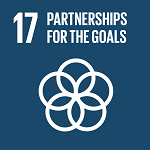
Recommendations particularly contributing directly to revitalizing the global partnership are presented again among the recommendations and reports introduced on Goals 1 to 16
| Academic Forum "Transdisciplinary research linking local solutions to global environmental challenges." (Japanese page) |
Committee on Future Earth Promotion and Collaboration |
Collaboration with diverse stakeholders, including academia, industry, government, and civic groups, is essential for solving global-scale issues, and “transdisciplinary research” that involves Co-Design, Co-Production, and Co-Delivery needs to be promoted.
This forum will introduce examples of good interdisciplinary research, both domestic and international, that aims to solve regional issues and discuss how this can be linked to interdisciplinary research that contributes to solving global-scale issues, promoting research, and achieving efficient results. In addition, the discussion will include how research should be evaluated and how human resources should be developed for the promotion of future research. |
Building a sustainable global society by strengthening disaster resilience:- Developing an "Online Synthesis System (OSS)"and fostering "Facilitators" to realize consilience -
(English version)(Japanese version) |
|
To promote risk-informed sustainable development, it is essential to construct an ecosystem for the unification of knowledge, or consilience. Consilience can only be realized through understanding the unique nature of global issues and the positions of stakeholders. This, in turn, leads to the possibility of designing and sharing an ideal form of disaster risk reduction to support societies. To promote consilience, we propose to develop an "Online Synthesis System (OSS)", and to train "facilitators", or field catalysts, who will convene and moderate meetings, lead problem-solving, and provide professional advice. |
| Aiming to build a social system that promotes citizen science(Japanese version only) |
|
Citizen science is carried out by the general public, and its activities are expanding globally. However, it is still in the process of building a social system that encourages researchers to formulate research plans with citizens and policy makers, create methodologies that promote research and disseminate research results, and promote environment that supports citizen science. Through our activities, the Young Academy of Japan has recognized the current state of citizen science in Japan compared to that of overseas. This proposal summarizes the committee's deliberations on promotion of "citizen science" based on the historical background (Shimin Kagaku) and the current state of citizen science and targets university, academic societies, the Ministry of Education, Culture, Sports, Science and Technology, and other ministries. |
| Toward Realizing a Sustainable Global Society - Promotion of Future Earth-(Japanese version only) |
Committee for Promoting the Future Earth Initiative |
Future Earth (FE) is an international program by collaboration with the scientific community, UN agencies, and other organizations to promote research to deal with various global environmental issues at the regional and national levels related to SDGs. We are pursuing a number of interdisciplinary international collaborative research projects, with the aim of solving issues such as water, energy, climate, ocean, ecosystem, and cities under FE. One of the five international headquarters secretariats of FE is in Japan, and the SCJ is in charge of its operation. This recommendation calls for promotion of FE in Japan to all scientific communities and stakeholders (policymakers, enterprises, local governments, media, education officials, citizen groups, etc.). |
| Japanese-style strategic support for industrial development
|
Committee on Area Studies
Subcommittee on International Regional Development Research |
To eliminate poverty in developing countries, it is extremely important to achieve industrial development, to create employment, and to improve the standard of living. However, there is no widely accepted strategy for industrial development. To provide more effective development support, Japan, which has an abundant proven track record of assisting developing countries in Asia, should develop support strategies by taking advantage of its experience. |













































